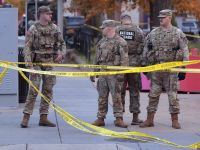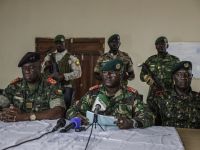Iraq agreed in talks last week to allow UN weapons inspectors to decide where and how to interview its citizens, chief inspector Hans Blix said in a letter.
According to AFP, the letter did not explicitly say the interviews could be conducted outside Iraq, as demanded by US President George W. Bush. But it did indicate a concession by the Iraqi authorities, who in the past insisted on monitoring conversations and sometimes intimidated interviewees.
The letter dated Oct. 8 was addressed to Amir El-Sadi, an aide to Iraqi President Saddam Hussein who led the Iraqi delegation to the talks, held in Vienna. In it, Blix and International Atomic Energy Agency director Mohammed El-Baradei asked El-Sadi to confirm points of agreement on practical arrangements for resuming inspections in Iraq after a halt of almost four years.
"We shall report accordingly to the Security Council," they wrote.
Meanwhile, key United Nations members edged closer to agreement on Iraq, US Secretary of State Colin Powell said.
According to Powell, he was in intense talks with French and Russian counterparts over their opposition to using the threat of force against Iraq in a UN Security Council resolution.
"The Iraqis are not going to do anything unless there is pressure," Powell stated. "It would be better for this pressure to be contained in one resolution."
Russia and France resist the threat of force against Iraq in any new resolution. "I'm in constant contact with my French colleague, my Russian colleague," Powell said. "We are trying to see if there is a way to resolve this difference of view."
Russian Foreign Minister Igor Ivanov was quoted as saying by Interfax that "If proposals are submitted to the UN Security Council that raise the effectiveness of weapons inspectors in Iraq, we will support them." But Ivanov did not confirm a statement made earlier by one of his deputies that Moscow was prepared to support a French proposal for a two-stage ultimatum to Saddam.
In contrast to Washington's wish for an all-in-one text, Paris has proposed two separate UN resolutions -- one setting out tough conditions for Iraqi cooperation with weapons inspectors and, if necessary, another threatening force if those conditions are not met.
For his part, French Foreign Minister Dominique de Villepin said Tuesday it is useless for France to brandish its veto at the United Nations Security Council regarding the decisions on how to resolve the Iraqi crisis.
"It is useless to brandish a veto when we can contribute with our partners to the adoption of a common position," said de Villepin at the National Assembly during a debate on Iraq. The foreign minister told deputies he is confident that members of the UN Security Council will reach a consensus to "address a forceful message" to Baghdad in the coming days.
"We should not tie up our own hands by brandishing a veto...It is important not to deprive any of our advantages," said de Villepin.
CIA
Central Intelligence Agency chief George Tenet warned the chances are high Iraq would resort to chemical and biological weapons if attacked by the United States.
"Should Saddam conclude that a US-led attack could no longer be deterred, he probably would become much less constrained in adopting terrorist actions," Tenet wrote to Senator Bob Graham of Florida.
Saddam might take the extreme step of assisting terrorists with weapons of mass destruction as "his last chance to exact vengeance by taking a large number of victims with him," Tenet wrote. "Iraq's increasing support to extremist Palestinians, coupled with growing indications of a relationship with al-Qaeda, suggest that Baghdad's links to terrorists will increase, even absent U.S. military action." (Albawaba.com)
© 2002 Al Bawaba (www.albawaba.com)







